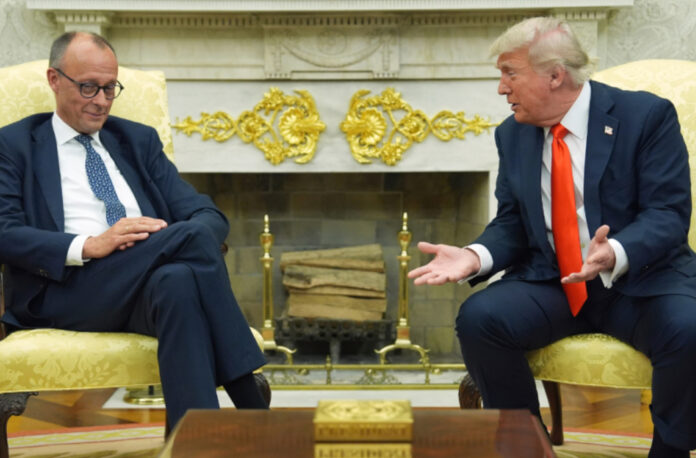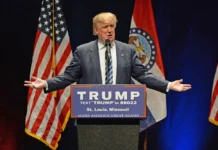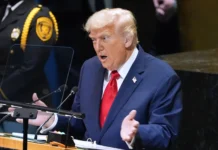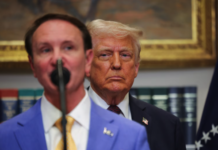In a surprising departure from his usual calls for peace, former President Donald Trump suggested Thursday that the ongoing war in Ukraine might benefit from a period of continued fighting before efforts to de-escalate.
Speaking at the Oval Office alongside Germany’s new Chancellor Friedrich Merz, Trump likened the conflict to a childhood scuffle, proposing that “sometimes you’re better off letting them fight for a while and then pulling them apart”—an analogy that drew widespread attention and criticism.
Trump’s remarks mark a notable shift in tone, as he previously emphasized the importance of stopping the bloodshed and supporting Ukraine’s sovereignty.
His analogy, comparing the war to a hockey game or a fight between children, seemed to endorse a hands-off approach, at least temporarily, suggesting that both sides—particularly Ukraine and Russia—should endure suffering before peace is pursued.
The former president claimed he relayed this perspective to Vladimir Putin in a recent call, though no evidence supports this assertion.
Chancellor Merz, meanwhile, carefully navigated the conversation, emphasizing the collective desire of Western allies to end the conflict swiftly and blaming Putin for the violence. His diplomatic finesse contrasted with Trump’s more provocative comments, as Merz reinforced Germany’s support for Ukraine and their shared goal of a peaceful resolution.
The meeting was also notable for the cordial personal rapport between the two leaders. Merz presented Trump with a gold-framed birth certificate of his grandfather, Friedrich Trump, and praised him as “the key person in the world” who could influence the course of the war.
Merz further invited Trump to visit Germany—an indication of the ongoing effort to foster a constructive relationship, despite differences on some issues.
On matters of defense and economy, Merz underscored Germany’s commitments amid ongoing tensions. He praised Berlin’s increased defense spending, thanks in part to Olaf Scholz’s historic 100 billion euro fund to modernize the Bundeswehr.
Trump, for his part, acknowledged Germany’s efforts and urged allies to meet his proposed NATO target of 5% of GDP on defense—up from the current 2%, a goal Merz supports for the future.
Trade also featured prominently in the discussions. Trump’s longstanding criticism of Germany’s auto exports and his threats of tariffs remain points of tension.
Despite delaying a proposed 50% tariff on European goods, Trump reiterated his willingness to escalate trade measures if negotiations with the European Union falter.
Merz emphasized the importance of mutual investment, noting Germany’s position as a major investor in the US, but warned that tariffs only harm economic growth—a stance that aligns with his broader push to revitalize Germany’s sluggish economy.
As the world watches, the meeting underscores the delicate diplomatic dance between the US and Europe. Trump’s provocative rhetoric on Ukraine and trade highlights ongoing divisions, even as leaders like Merz aim to fortify alliances and promote stability.
The coming months will reveal whether these dialogues can translate into tangible progress on multiple fronts—peace in Ukraine, economic growth, and renewed transatlantic cooperation.



















